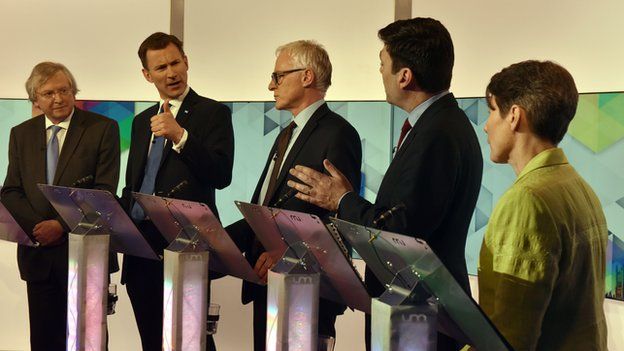Election 2015: Ban smoking in parks, UKIP candidate says
- Published

A cancer expert who is standing for UKIP says the smoking ban should be extended to public parks.
Prof Angus Dalgleish said his stance sounded "paradoxical" given his party's support for "smoking rooms" in pubs.
UKIP said a park smoking ban was not party policy and that Prof Dalgleish, who is based at St George's hospital in London, was giving a personal opinion.
He was speaking in a BBC health policy debate alongside representatives of the Tories, Labour, Lib Dems and Greens.
During the Daily Politics clash, Conservative Health Secretary Jeremy Hunt said the government's NHS reforms "weren't very popular".
And Labour's Andy Burnham said his party had gone too far on private sector involvement with the service.
They were joined on the panel by Lib Dem Care Minister Norman Lamb and Jillian Creasy from the Green Party.
Smoking should be banned in public parks - but not in pubs - UKIP spokesman Angus Dalgleish tells Andrew Neil in a TV debate
During the debate, each panellist was asked whether the smoking ban should be extended to private parks. They each said no apart from Mr Dalgleish, who said it should.
"I am thinking of parks where there are lots of children around," he added.
UKIP has pledged to amend the smoking ban to allow pubs to open "smoking rooms", provided they are well ventilated and separate from the rest of the premises.
In October, the party's deputy leader Paul Nuttall described a proposal to ban smoking in public parks as "nonsense" and a "gross infringement of people's liberties".
A party spokeswoman said: "There is no written policy from UKIP on banning smoking in parks. Prof Dalgleish, as one of the country's leading oncologists, was giving his personal opinion as he is more than entitled to do".
Each party representative agreed that 24-hour alcohol licensing, introduced by the Labour government, had been a "mistake", while Prof Dalgleish agreed with the Green Party's Jillian Creasy on the need for a "sugar tax".
In another part of the debate, Mr Hunt said the Health and Social Care Act, put in place by his predecessor Andrew Lansley, should have been better communicated. But he said the changes had "disbanded huge bureaucracies" in the shape of primary care trusts and strategic health authorities, and led to more doctors and nurses.
Labour's Andy Burnham said the 2012 Act had "pulled the rug from under the NHS" and gone back on a commitment of no "top-down reorganisations of the NHS" from the Conservatives.
Mr Burnham, who has repeatedly attacked the government over the extent of private sector involvement in the NHS, was asked about his party's record in government, when 5% of services were contracted out. He said he had "changed Labour's policy" since taking over as health secretary.
Lib Dem Care Minister Mr Lamb said independent exerts had found claims of privatisation resulting from the government's reforms had "not been borne out".
Ms Creasy called for the removal of private firms in the provision of services in the NHS, saying the "bureaucracy of the market system" was to blame for the pressures on the health service.
- Published29 April 2015
- Published17 October 2014